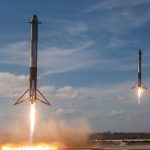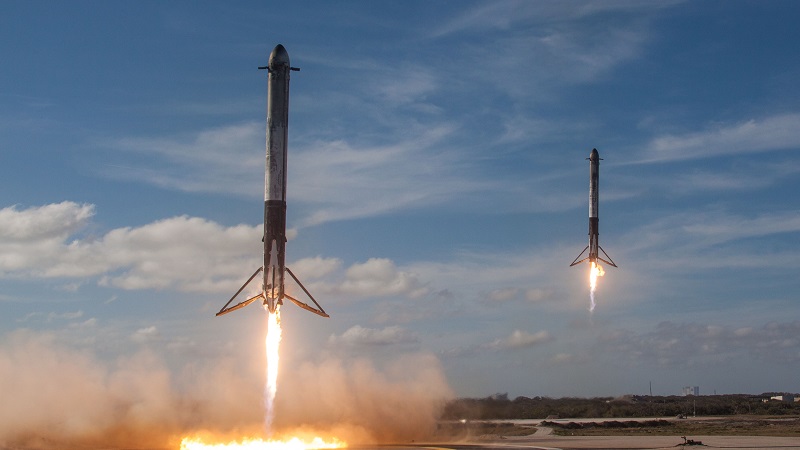Opinion: Elon Musk is the future
Feb. 6, SpaceX successfully test-launched the world’s most powerful rocket, dubbed the Falcon Heavy. The event was broadcasted live, allowing hundreds of thousands of people to see what visionary Elon Musk and his team have accomplished over the past few years. SpaceX employees and fans cheered as the seconds on the counter got closer to zero, their voices filled with confidence and pride.
The launch was almost perfect; the rocket achieved its goal of putting an object into orbit. At 140,000 pounds of capacity, the Falcon Heavy can carry more cargo than any other rocket on the market. The package sent to space for this test-flight was a cherry-red Roadster, a luxurious car from Musk’s other revolutionary company, Tesla. The car and its driver, a dummy nicknamed “Starman,” will travel the deep-void, orbiting the sun maybe for years to come.
All of this was performed as an exercise to prove SpaceX’s reliability to get the job done — and for a fraction of the price. Take United Launch Alliance’s Delta IV Heavy rocket, which costs about $400 million, a figure similar to what NASA’s Space Shuttle launch costs. Falcon Heavy, which can carry way more than both these other vessels, is a relative bargain costing only $90 million per launch. This dramatic price difference is in part a result of SpaceX’s reusable rocket technology, something Musk was once told would be impossible to achieve.
To add the cherry on the cake, the two boosters strapped to the sides of the trident-shaped rocket fell back from the sky — and landed smoothly on the ground. It was something out of a science-fiction movie. Sadly, the rocket’s core didn’t fare as well, crashing into the waters close to the landing zone. Other than that, given the reaction of press and fans, SpaceX couldn’t have hoped for a better outcome.
So a multi-billionaire tested a rocket and sent one of his toys to space. How does that benefit others? To answer this, you must realize this is not some grand hobby he picked up because he is a bored rich man. Instead, Musk has been planting the seeds for serious space exploration since the beginning of the millennium. Starting a company from the ground up — with the end-goal of sending people to Mars to colonize it — is something that would provoke laughter if it came from somebody else’s mouth. It happened multiple times to Musk earlier in his career, as evidenced by the fact SpaceX and Tesla were on the brink of bankruptcy. People pegged Musk as a charlatan; one that talks big and has little to show. Nowadays, the world has learned that when Musk says he is going to do something, he means it.
The Falcon Heavy brings Musk closer to achieving his grandiose dreams of making space exploration possible. How so? Its relative affordability makes it a more desirable choice in the private spaceflight market. NASA, for example, will once again be able to send astronauts to the International Space Station from the United States, as opposed to depending on Russia’s space program.
The more business SpaceX receives, the more funds that can be put towards research and development for their next big thing, the Big Falcon Rocket. The BFR is the rocket Musk plans to use to send people to Mars. As optimistic as usual, he believes this will happen in 2022, a mere six years from now.
Musk deserves to be recognized for his relentless persistence and seemingly unconceivable goals. While you have people banging their heads against walls, trying to come up with the next big time-wasting app, he’s in a different realm of thinking. This is a guy who wants to create high-speed underground trains to avoid wasting time in traffic, commercial rockets to go from New York to London in 30 minutes and equip every house in the country with solar panels for clean, reusable energy. Even if none of those lofty projects come to fruition, the fact someone is at least trying to do them is remarkable.
It was exciting to see the Falcon Heavy launch because, as Musk said, it’s proof that “crazy things can come true.” It might take him a while to deliver on his promises, but the fact he continues pushing the boundaries of science means he won’t stop until achieving them. Musk has revived the curiosity and fascination for space exploration that has been dormant for a while. Hopefully the success of Falcon Heavy ignites the passion in others, causing competition like Boeing and Washington’s own Blue Origin to develop similarly aggressive goals towards future space exploration. Who knows, we may even be the first generation to witness interplanetary travelling.







